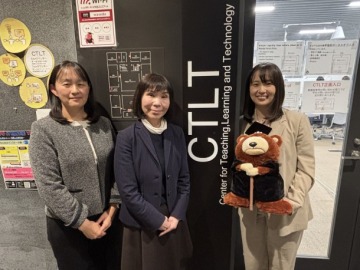Spring Semester 2020 Waseda University Presidential Teaching Award
Subject:Social Development in East and Southeast Asia 1
KORWATANASAKUL Upalat
In AY2020 spring semester, Associate Professor Upalat made an unexpected start by having to move courses online at the same time he took up his post at Waseda University.
In the face of such challenges, Associate Professor Upalat won the award by conducting a highly satisfying class that incorporated discussions.
Though he humbly says that “I owe it all to the imaginative students in the class,” he was able to create a meaningful experience for his students even in an online environment.
What are the secrets to having meaningful discussions?
Incorporate topics that are familiar to students and try to make lectures easy to understand.
This class was one of the courses offered entirely in English as part of the Social Innovation Accelerate Program of the Faculty of Social Sciences, and half of the approximately 10 students enrolled were international students mainly from Asia. The goal of the course was to explore the factors and conditions that promote and hinder social development, with a focus on social problems and social development in East and Southeast Asia, with the SDGs as keywords.
Students were required to read in advance the materials related to the theme of the class. After a lecture in the first half of the class, students were then divided into two groups for discussion in the second half of the class. The class would conclude by sharing each group’s discussion contents, followed by supplementary comments from the instructor. All lectures and discussions were delivered in real-time, using ZOOM as well as Moodle’s Collaborate function.
Associate Professor Upalat laughs that, as this was his first time giving lectures online, he felt uncomfortable at first because “it was like talking to a wall.” “To make sure there were no problems with my internet connection, I would ask students every 10 minutes or so if they have any questions,” he recalls. Even when there were no questions, the students responded with “no” using the chat function, and therefore he was able to get some responses from them.
The students’ video may be turned off, and even when it was turned on, the student’s face was not visible when the class materials were displayed on the screen. “Since I couldn’t see the students, I couldn’t get a sense of how well they were understanding the course, unlike in face-to-face classes. So, I tried to choose topics and subjects that were as familiar to them as possible. Especially in online courses, students lose focus if the topics are not relevant to them,” he says.
Since it was difficult to grasp the students’ level of understanding, Associate Professor Upalat took care to make his explanations easy to understand. “I spent three times as much time preparing for the lecture as I had before,” he said, “including practicing with my friends and correcting any parts that I felt were difficult to understand.” As a result, the students listened intently to and understood the lecture, as evidenced by the discussions that followed.
Monitor the discussions, but do not intervene.
During the discussions, Associate Professor Upalat would join each group as needed and monitor what the students were talking about. “When the discussion was not going well, I would give some advice on where to take the discussion, but for the most part I would not say anything because I wanted the students to think for themselves.”
In addition to the very thorough explanations in the lectures, students expressed satisfaction with learning through discussion, saying that they “were asked to participate, discuss, and analyze, rather than just listen,” and that they “were able to share their values with other students from diverse backgrounds.”
The reason why Associate Professor Upalat emphasized discussion is because discussions are an opportunity to practice leadership, the ability to accept others, and the ability to work as a team, all of which are important for future careers. “When you go abroad, you learn a lot from cultural differences through discussions, so I encourage my students to learn from my own study abroad experience,” he says.
Building relationships where instructors and students can talk about not just academics, but also about life.
Grades were determined by two reports (midterm and end of term) and participation; there were no exams. “The students all participated actively in the discussions, so almost everyone got full points in participation,” says Associate Professor Upalat.
Associate Professor Upalat always made sure to give feedback on students’ reports. In addition to giving individual feedback on each submitted report, he would also give advice to enthusiastic students who submitted drafts of their reports in advance and allowed them to revise their reports before submitting them. “I don’t want students to just submit their reports, so I value giving feedback.”
Although there was no choice in having to move the course online, he feels that it was convenient in some ways, such as the way students could share ideas by using functions such as screen sharing. “But I still prefer face-to-face classes,” he says. “I prefer to give lectures while writing on the blackboard rather than using slides.”
To care for students’ mental well-being due to everything moving online, Associate Professor Upalat made sure to be online 30 minutes before class started and ask the students who were there early “How are you feeling these days?”. “I heard from some students that they were having a hard time with all the reports required for their classes, so I tried to reduce their burden as much as possible, and also made adjustments to incorporate topics that the students wanted to discuss.”
Associate Professor Upalat values his relationships with the students. He says that his idea of an ideal instructor is “someone who can communicate with students not only about their studies, but also about life in general. My former mentor, whom I look up to a lot, was the kind of person I could talk to about life, so I want to be able to have that kind of connection with my students as well.”
As this was the first year, he was offering the course, he reflects that “there are many areas for improvement,” but also feels that it was good that he strived to speak candidly with the students. “I think that by creating an environment where students felt comfortable speaking up, they found the course interesting and learned not only from the instructor but from their classmates as well. In an ever-changing world, what is learned in class may soon become outdated, so I hope the students will continue to learn,” says Associate Professor Upalat.





